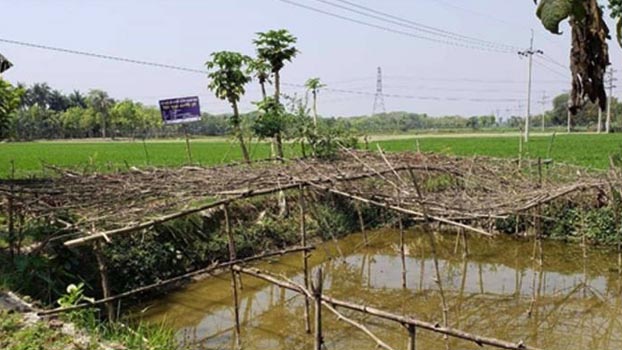Alternative farming method benefits Kaliganj farmers


When the farmers were compelled to reduce the paddy farming due to higher production cost and continuous loss in the traditional farming, about 300 farmers of Kaliganj upazila in Jhenaidah have been cultivating paddy with preserved rain water.
They have been raring fish and producing vegetables on the ridge of the plots and reaping better. The programme was disseminated in 20 villages of two unions of the upazila under “Pani Sasroyee Karjokari Krishi Anushilon Prokalpa” (water saving effective agriculture practices project), said the farmers.
During a visit at Sundarpur village of Kaliganj, the farmers said they had dug mini ponds at the corner of the rice plots and preserving water there. They released fish fries in the ponds. The stored water is used as irrigation water when needed.
Huge vegetables like pumpkin, sweet pumpkin, papaya, aurum, egg plants, tomato etc. were being produced on the ridges of the ponds to make up the deficiency caused by the paddy.
The farmers said usually a farmer has to spend Taka at least 20 thousand for each bigha (40 decimals) of land for seeds, fertilizer, irrigation, weeding, harvest and some other costs. But they produce 30 to 32 maunds of paddy for an amount of Taka 20 to 22 thousand in a season. It is a losing concern for the farmers. They have been consuming the vegetables and fish for family purposes and selling the remaining in the local market. It has been providing them extra money and ensure profit as a whole.
Shibu Pada Biswas, executive director of an NGO Sonar Bangla, said they have been implementing the farming project with the financial assistance of Japan Fund for Global Environment (JFGE) since 2019 in the area. The organization had dug 200 mini ponds each for Taka 10 thousand to for 100 farmers for the mixed farming.
The farmers in the project area were provided orientation training on preserved water management and relevant other aspects to make the farming profitable as well as sustainable.
Upazila agriculture officer (UAO) in Kaliganj Zahidul Karim said the farming will save irrigation water and environment and bring additional money for the farmers from fish and vegetables at time. Department of agriculture extension (DAE) has been proving technical assistance for the farmers of the project area to make it sustainable. It will help them financially, UAO said.



